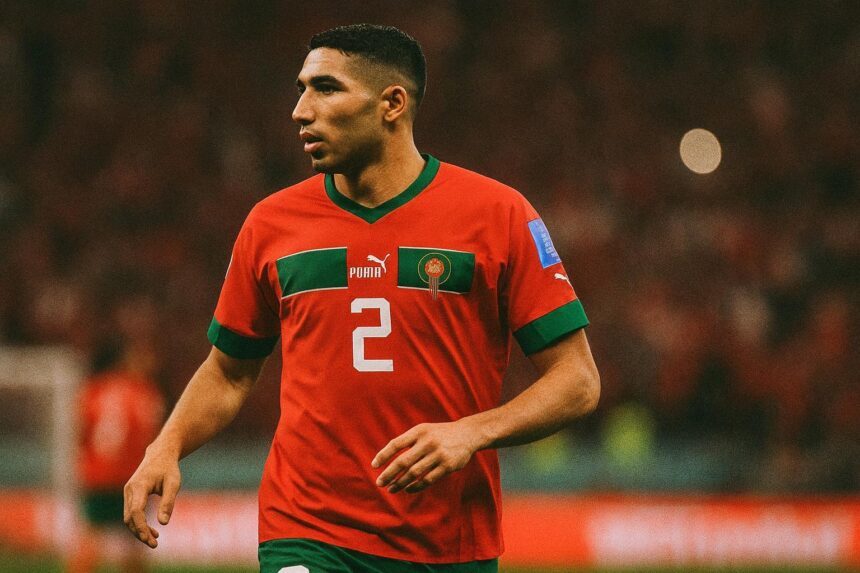Continental Spotlight on a Parisian Right-Back
Few defensive players command the attacking imagination of fans and pundits alike. Achraf Hakimi, the marauding Moroccan right-back of Paris Saint-Germain, has managed precisely that, weaving decisive runs down the flank while anchoring the French champions’ back line. As the Confederation of African Football prepares the shortlist for its 2025 Ballon d’Or, the Rabat-born defender stands prominently alongside forwards Mohamed Salah, Victor Osimhen, Ademola Lookman, Serhou Guirassy and Bryan Mbeumo. Yet it is Hakimi’s balance of defensive rigour and offensive audacity that differentiates him in a field often dominated by strikers.
Club Achievements That Bend the Narrative
Paris Saint-Germain’s latest campaign adds statistical heft to Hakimi’s candidacy. The capital side secured Ligue 1, lifted the UEFA Champions League and reached the FIFA Club World Cup final, achievements that rarely escape the attention of CAF jurors (L’Equipe 2024). Although individual awards are never bestowed solely on collective silverware, a defender embedded in multiple trophies gains an aura of indispensability. Hakimi’s tally of twenty-five goals for PSG by the close of the 2024-2025 season—uncommon for a full-back—further undermines the striker-centric orthodoxy that usually shapes voters’ preferences.
National Duty and Soft-Power Capital
Morocco’s diplomatic outreach increasingly leans on sporting successes, an approach visible since the Atlas Lions’ historic 2022 World Cup semi-final. In that continuum, Hakimi personifies a national project that couples elite performance with regional leadership ambitions (Moroccan MFA 2025). He captured Olympic bronze with the U-23 squad in Paris and remains central to the senior team’s steady march toward the 2026 World Cup. Such feats solidify Rabat’s cultural diplomacy and craft a narrative of modern African professionalism that resonates from the Maghreb to the Gulf.
A Defender in the Strikers’ Club
Historically, only a handful of defenders—such as Morocco’s Noureddine Naybet—have challenged Africa’s attacking royalty for individual honours. Mohamed Timouni, Ballon d’Or laureate in 1985, notes that Hakimi’s ‘capacity to oscillate between sentinel and spearhead places him in the small pantheon of complete modern footballers’ (Le Matin 2025). His stamina allows Paris and Morocco to transition rapidly, blurring positional conventions that once confined defenders to anonymity in award ceremonies.
Rival Profiles and Statistical Stakes
While Hakimi’s momentum is palpable, the forward line of Salah, Osimhen and Lookman continues to deliver headline-grabbing numbers. Salah’s leadership at Liverpool sustains his aura of reliability, whereas Osimhen’s goal spree in Naples and Lookman’s Europa League heroics keep them in robust contention (CAF Analytics 2025). Serhou Guirassy’s Bundesliga efficiency and Bryan Mbeumo’s Premier League creativity add further complexity to vote projections. Against such firepower, Hakimi’s defensive metrics—interceptions, progressive carries and chance creation—must persuade jurors that influence transcends goal tallies.
Implications for African Football Governance
The 2025 award arrives amid broader conversations on competitive equity and infrastructural investment across the continent. CAF’s reform agenda, endorsed by several Central African states including Congo-Brazzaville, emphasises talent retention and enhanced youth academies. A defender’s triumph would endorse that platform by validating tactical education over pure attacking flair, reinforcing Abuja and Brazzaville’s shared view that holistic player development underpins Africa’s international bargaining power (Central African Sports Charter 2024).
A Prognosis Tempered by Football Diplomacy
Regardless of final votes, Hakimi’s candidacy exemplifies football’s capacity to reframe diplomatic narratives. His ascent aligns with an era in which African capitals deploy sporting icons as envoys of cultural modernity, harmony and economic partnership. For neutral observers, there is strategic value in a defender lifting Africa’s most coveted individual prize: it spotlights versatility, fosters tactical sophistication and underscores the continent’s readiness to redefine excellence on its own terms.



















